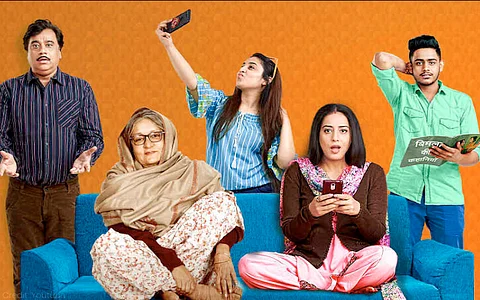
- Reviews
- Power List 2024
- Cannes 2024
- In-Depth Stories
- Web Stories
- News
- FC Lists
- Interviews
- Features
- FC SpecialsFC Specials

Director: Gagan Puri
Writer: Gagan Puri
Cast: Manu Rishi Chadha, Mahie Gill, Dolly Ahluwalia, Mehak Manwani, Shardul Rana
Cinematographer: Soni Singh
Editor: Shubham Srivastava
Streaming on: Netflix
The older I get, the more I think about how far I would go to protect my ageing parents. I imagine that when I was a child, they felt like the protagonists of Life Is Beautiful or The Pursuit of Happyness – adults who would hide the darkness and create make-believe universes to preserve the innocence of their kids. Life now comes full circle, and I find myself wondering if I would do what Urmila Matondkar's character does for her father, a senile professor (Anupam Kher), in Jahnu Barua's Maine Gandhi Ko Nahi Mara: A dementia-afflicted man suddenly believes he is the one who killed Mahatma Gandhi, and at one point, his daughter enlists the help of friends and doctors to manufacture a courtroom trial so that the father is "officially" acquitted of all charges. Only movies can do justice to premises that feature the art of creating lies.
Gagan Puri's Door Ke Darshan, too, falls in the same category. A middle-class Punjabi family, helmed by Sunil Bhateja (Manu Rishi Chaddha), decides to recreate the year 1989 after his old mother (Dolly Ahluwalia) wakes up from a 30-year-long coma. I was actually quite charmed by the one-liner of the movie. A story about pretending always has the potential to be both nostalgic and unsettling. But unlike Barua's moving drama, Door Ke Darshan (an ode to India's iconic state-run television channel) chooses to be a loud "Delhi" comedy – a genre of crass class jokes, Punjabi sound cues, quirky characters and outdated social humour. The director gets so busy fetishizing the cultural fabric of the story that the heart of it is lost somewhere between Manu Rishi's kind face and Dolly Ahluwalia's grating over-the-topness.
I tapped out the moment I saw the old lady's "coma look" – eyes open, tongue out, like a dead body trying to amuse a child
Within the first five minutes, we see the vulgar North Indian version of a gay stereotype: a boy who insists on bending over and speaking in an effiminate tone. Then there's a school principal who likes to play ludo with the parents of punished students. Sunil's son and the son's friend (Sumit Gulati, always in Talvar mode even when he's not) are obsessed with smutty adult magazines, while the daughter's friend has a lisping problem that makes "Bank se loan" sound like, well, you know. Lori is pronounced as something similar by a Hindi teacher, and the two boys touching themselves to a sex story is what jolts the grandmother out of her lifelong coma. The testosterone is unbearable. I tapped out the moment I saw the old lady's "coma look" – eyes open, tongue out, like a dead body trying to amuse a child.
The tasteless treatment is unfortunate, because the setup is not bad. Sunil is separated from his wife (Mahie Gill), who obviously rides a Royal Enfield to depict the independence of a woman unafraid to ask for a divorce. Sunil also lives as a tenant in a Gulabo Sitabo sort of situation – his landlord and childhood friend, Goldie (Rajesh Sharma), hate-loves him for the 800-a-month rent and his sad personal life. The old woman's awakening becomes an opportunity for estranged husband and wife to reconnect, even as they pretend to play infatuated school kids in a house of rotary dial telephones, pasty green walls, grandfather clocks and Doordarshan serials. Especially funny is a sequence where they enlist the help of younger people to recreate a DD news telecast – the lady wonders who Virat Kohli is and asks if Kapil Dev is injured, and Sunil convinces her that she misheard Sita Ka Swayamwar as "Rakhi Ka Swayamwar".
But perhaps my biggest peeve with the film is its class-deaf gaze. Sunil convinces his teenage kids to become "servants" in the house because he doesn't want his mother to know that his married life is in tatters 30 years later. The bitter old lady keeps scolding the homeless-looking kids, treating them badly and reminding them of their 'place' in the house. I'm sure this is a reality in several households even today, but the film tries to derive humour out of these scenes – in the reactions of the kids and in the dialogue of the woman. This makes the woman so overbearing and unlikable that one can't be faulted for wondering if the family was simply better off when she was a vegetable.
It also doesn't help that most Hindi comedies have no sense of middle ground. They operate in extreme binaries – scenes are either played for crazy laughs or for weepy tears. There's no in-between: they are scored by either emotional piano solos or loud tumbi-dhol riffs. As a result, a moment routinely goes from everyone playing the fool to a dramatic exchange between mother and son – and I'm never sure which of the two tones is the odd one out. Door Ke Darshan isn't sure either. I certainly might consider going so far for an ailing parent, but not for the prospect of "entertaining" curious onlookers. It should never look like we're making sacrifices to be seen – or marvelled at.